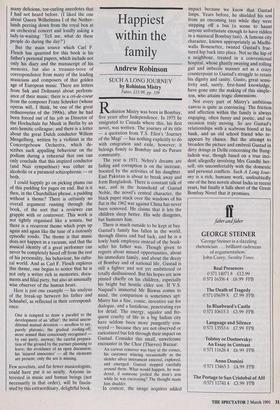Happiest within the family
Andrew Robinson
SUCH A LONG JOURNEY by Rohinton Mistry Faber, £13.99, pp. 339 Rohinton Mistry was born in Bombay, five years after Independence. In 1975 he emigrated to Canada where this, his first novel, was written. The journey of its title — a quotation from T.S. Eliot's 'Journey of the Magi' — has nothing explicitly to do with emigration and exile, however; it belongs firmly to Bombay and its Parsee community.
The year is 1971. Nehru's dreams are fading and corruption is on the increase, boosted by the activities of his daughter. East Pakistan is about to break away and form Bangladesh. There is constant talk of war, and in the household of Gustad Noble, the novel's central character, the black paper stuck over the windows of his flat in the 1962 war against China has never been removed. He claims that it lets the children sleep better. His wife disagrees, but humours him.
There is much outside to be kept at bay. Gustad's family has fallen in the world, through illness and bad luck, and he is a lowly bank employee instead of the book- seller his father was. Though given to regrets about missed opportunities, about his immediate family, and about the decay of Bombay and of national life, Gustad is still a fighter and not yet embittered or totally disillusioned. But his hopes are now pinned chiefly on his children, especially his bright but hostile elder son. If V.S. Naipaul's immortal Mr Biswas comes to mind, the comparison is sometimes apt: Mistry has a fine, comic, inventive ear for dialogue, and a fastidious, penetrating eye for detail. The energy, squalor and fre- quent cruelty of life in a big Indian city have seldom been more pungently con- veyed — because they are not observed or caricatured but felt through their impact on Gustad. Consider this small, unwelcome encounter in the Chor (Thieves) Bazaar:
An earwax remover was busy at the corner, his customer wincing occasionally as the slender silver instrument entered, explored, and emerged. Gustad stepped carefully around them. What would happen, he won- dered, if someone jostled the man's arm while he was excavating? The thought made him shudder.
In context, the image acquires added impact because ive know that Gustad limps. Years before, he shielded his son from an oncoming taxi while they were stepping off a bus (a scene to haunt anyone unfortunate enough to have ridden in a maniacal Bombay taxi). A famous city character, known appropriately as Madhi- walla Bonesetter, twisted Gustad's frac- tured hip back into place. Not so the hip of a neighbour, treated in a conventional hospital, whose ghastly swaying and rolling gait and imbecile manner act as a crazy counterpoint to Gustad's struggle to retain his dignity and sanity. Gusto, great sensi- tivity and, surely, first-hand knowledge, have gone into the making of this simple- ton, who attains tragic dimensions.
Not every part of Mistry's ambitious canvas is quite as convincing. The friction and affection within the family is always engaging, often funny and poetic, and on occasion truly moving. So are Gustad's relationships with a scabrous friend at his bank, and an old school friend who re- appears by chance. But the attempt to broaden the picture and embroil Gustad in dirty doings in Delhi concerning the Bang- ladesh war, though based on a true inci- dent allegedly involving Mrs Gandhi her- self, sits uncomfortably with the domestic and personal conflicts. Such A Long Jour- ney is a rich, humane work, undoubtedly one of the best novels about India in recent years, but finally it falls short of the Great Bombay Novel that it promises.


















































 Previous page
Previous page